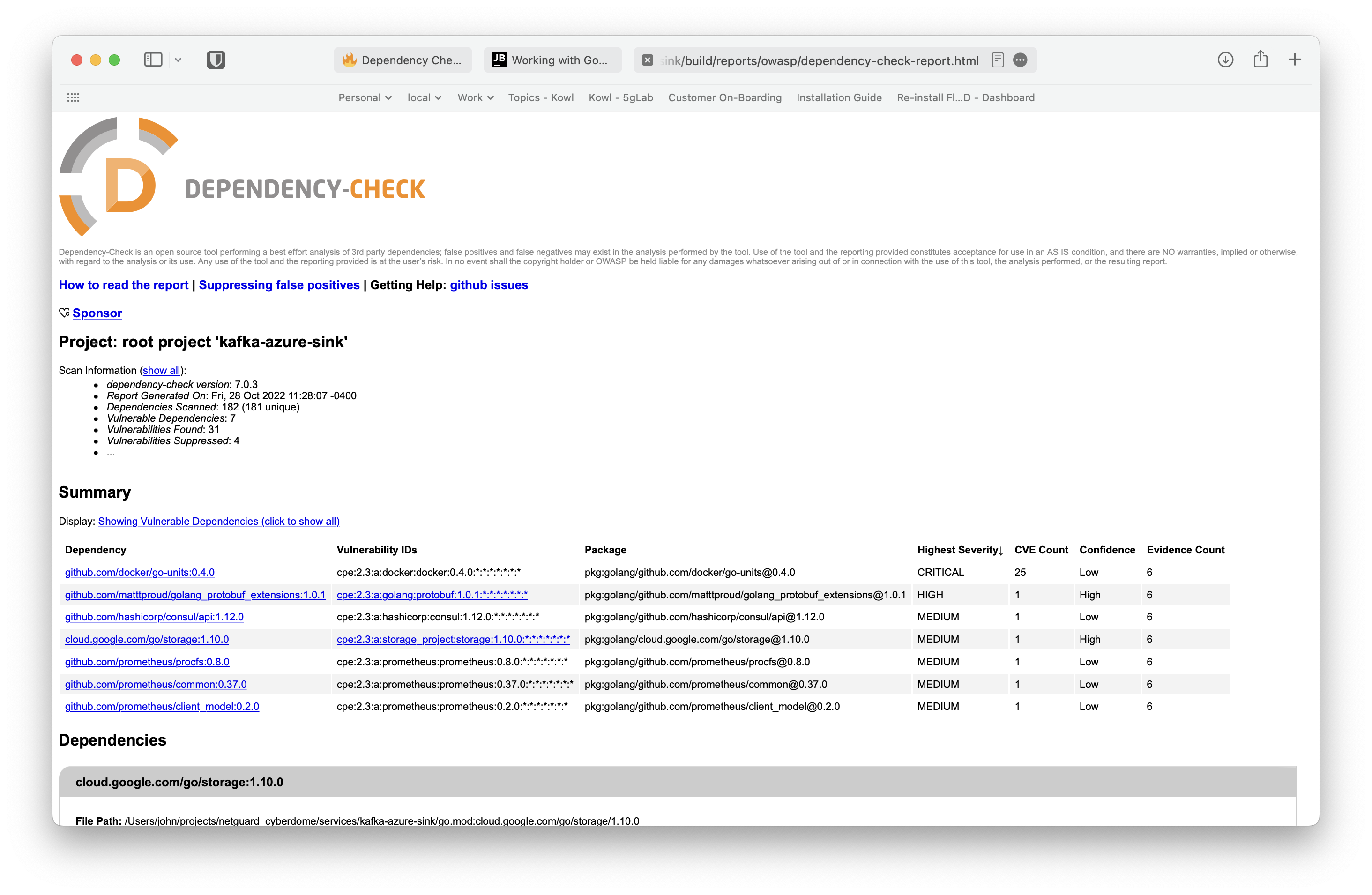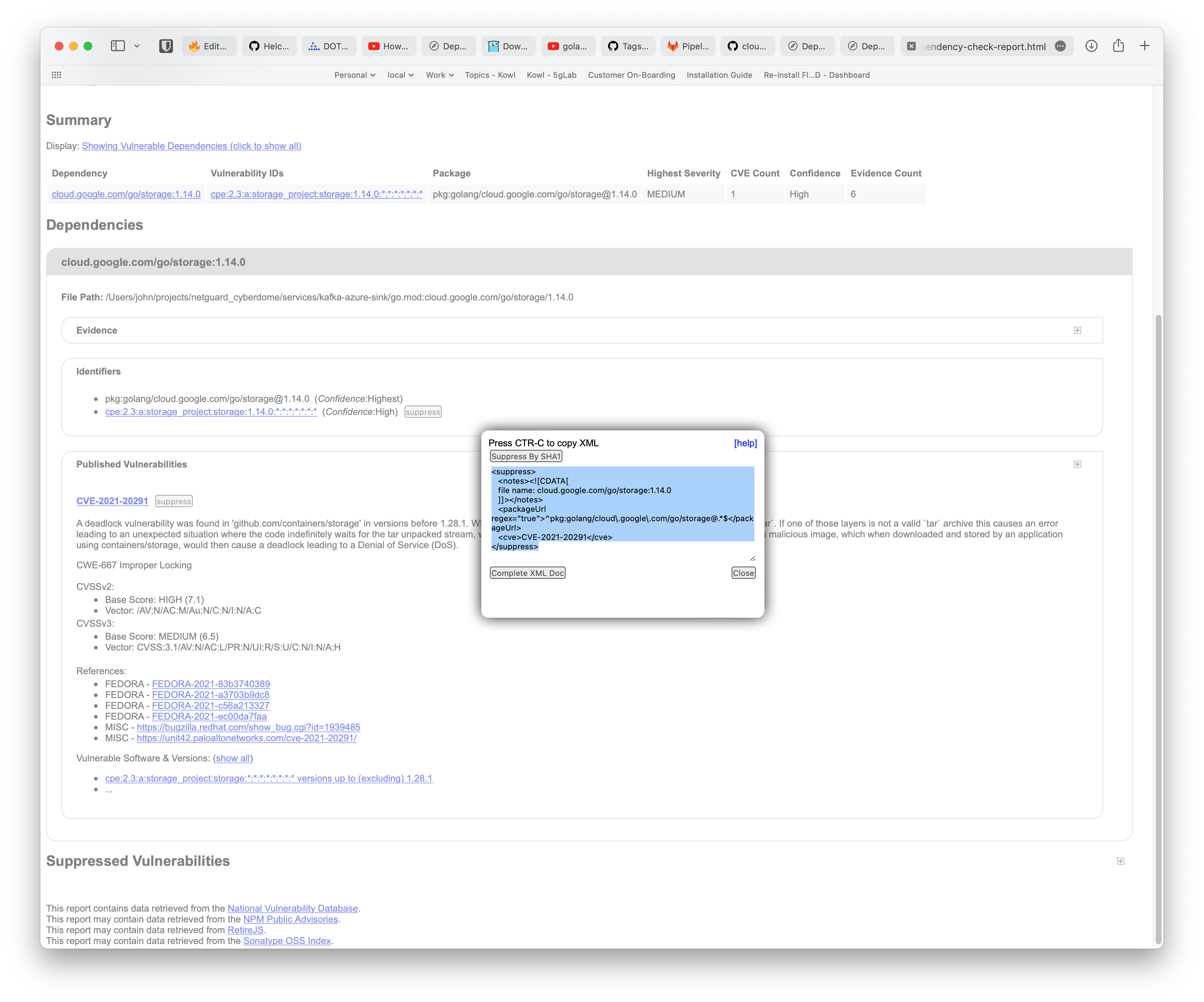The following build.gradle will perform the vulnerability check against our Go project.
apply plugin: 'org.owasp.dependencycheck'
buildscript {
repositories {
mavenCentral()
}
ext {
owaspPluginVersion = '7.0.3'
}
dependencies {
classpath "org.owasp:dependency-check-gradle:${owaspPluginVersion}"
}
}
dependencyCheck {
failOnError = false
format = 'ALL'
outputDirectory = "${buildDir}/reports/owasp"
suppressionFile = "${projectDir}/owasp-suppressions.xml"
analyzers {
experimentalEnabled = true
golangModEnabled = true
pathToGo = '/usr/local/go/bin/go'
}
}
task build() {
// empty
}
build.dependsOn (dependencyCheckAnalyze) |
Running the build will perform the dependency check
$ ./gradlew build |
... > Task :dependencyCheckAnalyze Verifying dependencies for project kafka-azure-sink Checking for updates and analyzing dependencies for vulnerabilities Generating report for project kafka-azure-sink Found 31 vulnerabilities in project kafka-azure-sink One or more dependencies were identified with known vulnerabilities in kafka-azure-sink: go.mod (pkg:golang/cloud.google.com/go/storage@1.10.0, cpe:2.3:a:storage_project:storage:1.10.0:*:*:*:*:*:*:*) : CVE-2021-20291 go-units@v0.4.0 (pkg:golang/github.com/docker/go-units@0.4.0, cpe:2.3:a:docker:docker:0.4.0:*:*:*:*:*:*:*) : CVE-2014-0047, CVE-2014-0048, CVE-2014-5277, CVE-2014-5278, CVE-2014-5282, CVE-2014-6407, CVE-2014-8178, CVE-2014-8179, CVE-2014-9356, CVE-2014-9358, CVE-2015-3627, CVE-2015-3630, CVE-2015-3631, CVE-2016-3697, CVE-2017-14992, CVE-2019-13139, CVE-2019-13509, CVE-2019-15752, CVE-2019-16884, CVE-2019-5736, CVE-2020-27534, CVE-2021-21284, CVE-2021-21285, CVE-2021-3162, CVE-2022-25365 go.mod (pkg:golang/github.com/hashicorp/consul/api@1.12.0, cpe:2.3:a:hashicorp:consul:1.12.0:*:*:*:*:*:*:*) : CVE-2022-40716 golang_protobuf_extensions@v1.0.1 (pkg:golang/github.com/matttproud/golang_protobuf_extensions@1.0.1, cpe:2.3:a:golang:protobuf:1.0.1:*:*:*:*:*:*:*) : CVE-2021-3121 client_model@v0.2.0 (pkg:golang/github.com/prometheus/client_model@0.2.0, cpe:2.3:a:prometheus:prometheus:0.2.0:*:*:*:*:*:*:*) : CVE-2019-3826 go.mod (pkg:golang/github.com/prometheus/common@0.37.0, cpe:2.3:a:prometheus:prometheus:0.37.0:*:*:*:*:*:*:*) : CVE-2019-3826 go.mod (pkg:golang/github.com/prometheus/procfs@0.8.0, cpe:2.3:a:prometheus:prometheus:0.8.0:*:*:*:*:*:*:*) : CVE-2019-3826 See the dependency-check report for more details. |
Open the report in your browser:
$ open build/reports/owasp/dependency-check-report.html |

When a vulnerability is found we will need to do the following things:
Try to fix the vulnerability by updating the library
module kafka-azure-sink go 1.18 require ( ... github.com/docker/go-units v0.5.0 ) |
Issue the following commands to fix the go.mod/go.sum files.
$ go mod vendor $ go mod tidy |
Build the project to verify all is well
go build -o ./kafka-azure-sink ./src/cmd/svc |
Re-run the Gradle Build
./gradlew build |
We can try to figure out who is linking the library in question using the go mod graph command.
$ go mod graph |grep <dependency> |
Example - Find out who is using storage@v1.14.0
$ go mod graph |grep storage |grep 1.14.0 github.com/spf13/afero@v1.8.2 cloud.google.com/go/storage@v1.14.0 <-- pulled in by afero cloud.google.com/go/storage@v1.14.0 cloud.google.com/go@v0.75.0 cloud.google.com/go/storage@v1.14.0 github.com/golang/protobuf@v1.4.3 cloud.google.com/go/storage@v1.14.0 github.com/google/go-cmp@v0.5.4 cloud.google.com/go/storage@v1.14.0 github.com/googleapis/gax-go/v2@v2.0.5 cloud.google.com/go/storage@v1.14.0 golang.org/x/mod@v0.4.1 cloud.google.com/go/storage@v1.14.0 golang.org/x/oauth2@v0.0.0-20210218202405-ba52d332ba99 cloud.google.com/go/storage@v1.14.0 golang.org/x/sys@v0.0.0-20210225134936-a50acf3fe073 cloud.google.com/go/storage@v1.14.0 golang.org/x/tools@v0.1.0 cloud.google.com/go/storage@v1.14.0 google.golang.org/api@v0.40.0 cloud.google.com/go/storage@v1.14.0 google.golang.org/genproto@v0.0.0-20210226172003-ab064af71705 cloud.google.com/go/storage@v1.14.0 google.golang.org/grpc@v1.35.0 $ go mod graph |grep afero kafka-azure-sink github.com/spf13/afero@v1.8.2 github.com/spf13/afero@v1.8.2 cloud.google.com/go/storage@v1.14.0 github.com/spf13/afero@v1.8.2 github.com/googleapis/google-cloud-go-testing@v0.0.0-20200911160855-bcd43fbb19e8 github.com/spf13/afero@v1.8.2 github.com/pkg/sftp@v1.13.1 github.com/spf13/afero@v1.8.2 golang.org/x/crypto@v0.0.0-20211108221036-ceb1ce70b4fa github.com/spf13/afero@v1.8.2 golang.org/x/oauth2@v0.0.0-20210218202405-ba52d332ba99 github.com/spf13/afero@v1.8.2 golang.org/x/text@v0.3.4 github.com/spf13/afero@v1.8.2 google.golang.org/api@v0.40.0 github.com/spf13/viper@v1.13.0 github.com/spf13/afero@v1.8.2 <--- pulled in by viper |
Now that we have found the import that we are using, we can check to see if the library can be updated to a newer version. If not, we need to see if the error is really a problem.
Vulnerability
File Path: /Users/john/projects/netguard_cyberdome/services/kafka-azure-sink/go.mod:cloud.google.com/go/storage/1.14.0 CVE-2021-20291 A deadlock vulnerability was found in 'github.com/containers/storage' in versions before 1.28.1. When a container image is processed, each layer is unpacked using `tar`. If one of those layers is not a valid `tar` archive this causes an error leading to an unexpected situation where the code indefinitely waits for the tar unpacked stream, which never finishes. An attacker could use this vulnerability to craft a malicious image, which when downloaded and stored by an application using containers/storage, would then cause a deadlock leading to a Denial of Service (DoS). |
In the above section, we found that storage@1.14.0 is used by afero@v1.8.2 which is used by viper@v1.13.0.
We use viper for reading our environment variables. We do not use viper with an afero file system, so we can confidently suppress this vulnerability.
From the dependency-check-report.html we can click on the suppress button and copy the text to our owasp-suppressions.xml file.

It is best to add some information around why we suppressed the vulnerability.
<suppressions>
...
<suppress>
<notes><![CDATA[
file name: cloud.google.com/go/storage:1.14.0
github.com/spf13/afero@v1.8.2 included as port of github.com/spf13/viper@v1.13.0
We are not using the afero filesystem with viper.
]]></notes>
<packageUrl regex="true">^pkg:golang/cloud\.google\.com/go/storage@.*$</packageUrl>
<cve>CVE-2021-20291</cve>
</suppress>
</suppressions> |